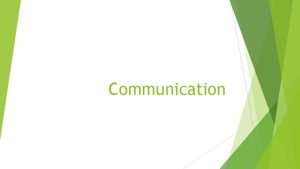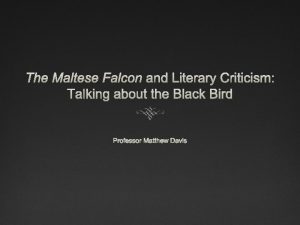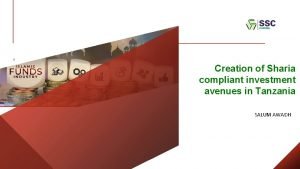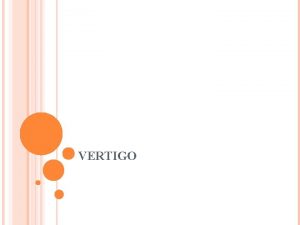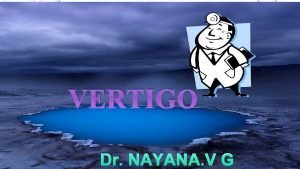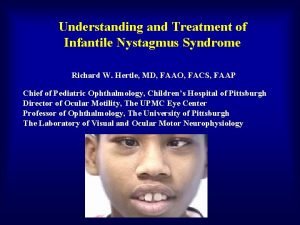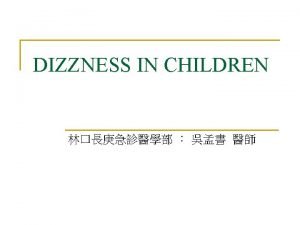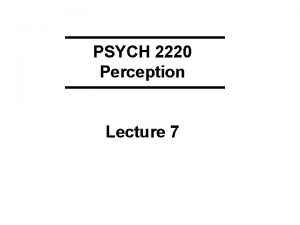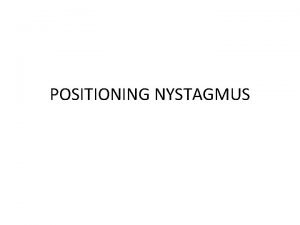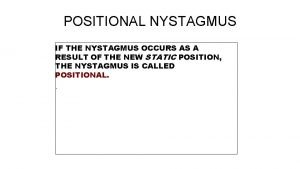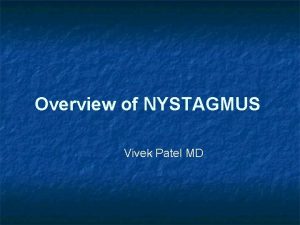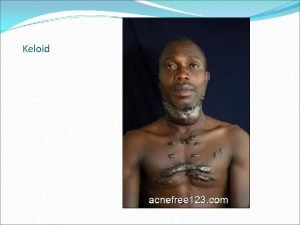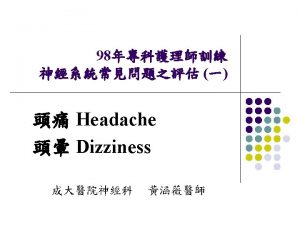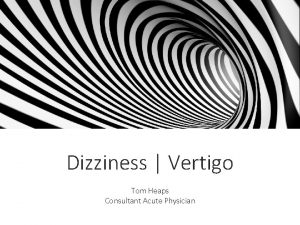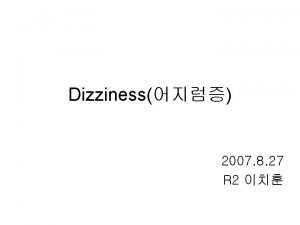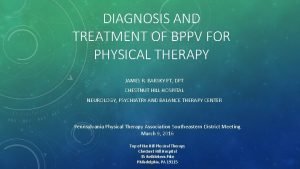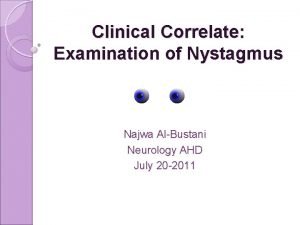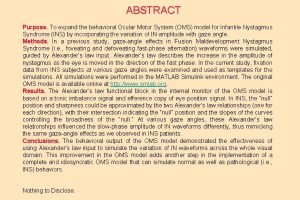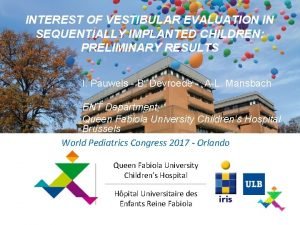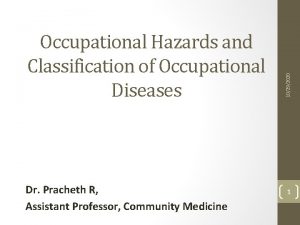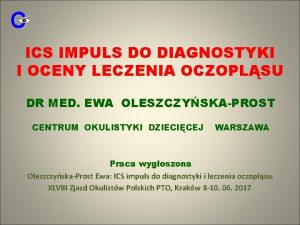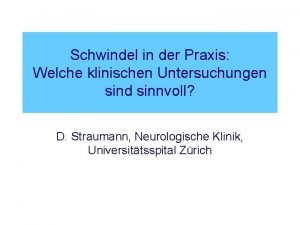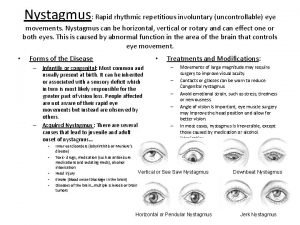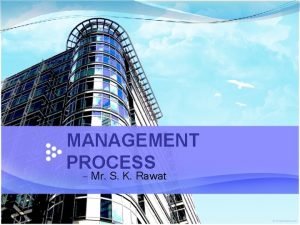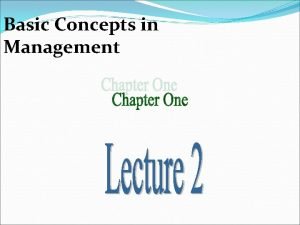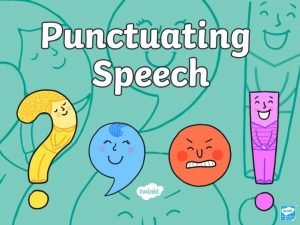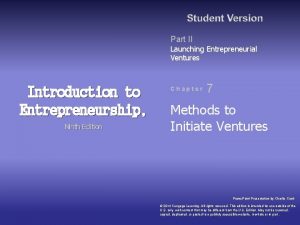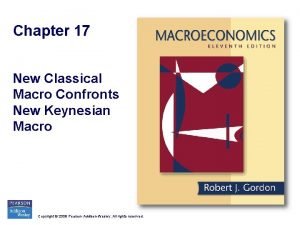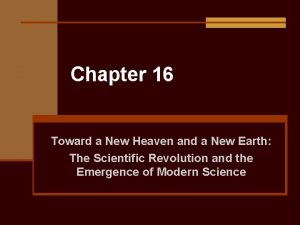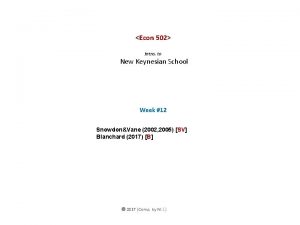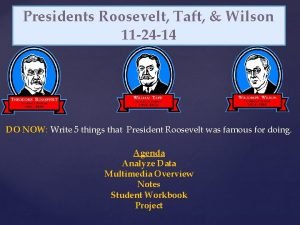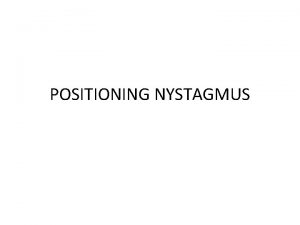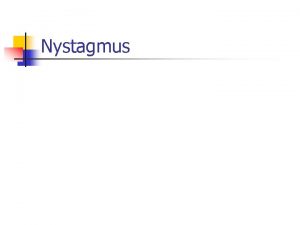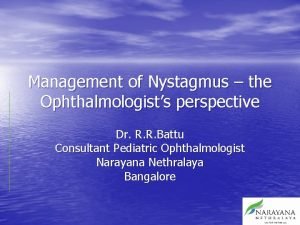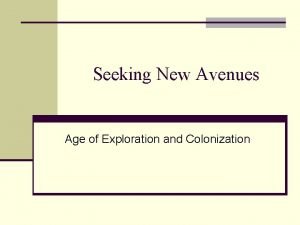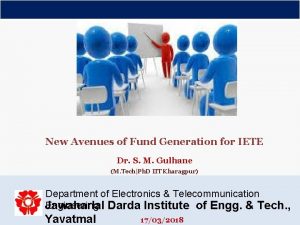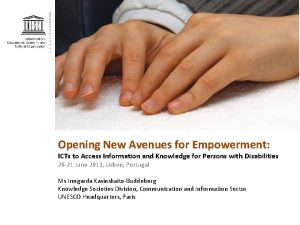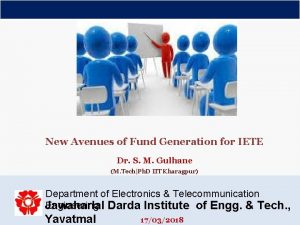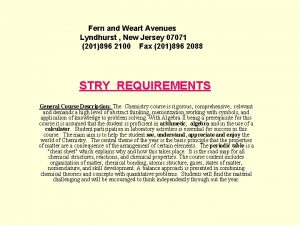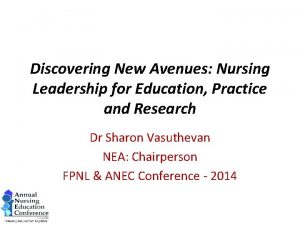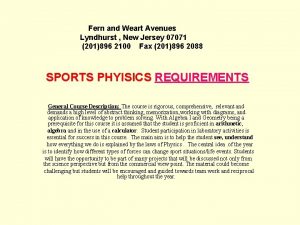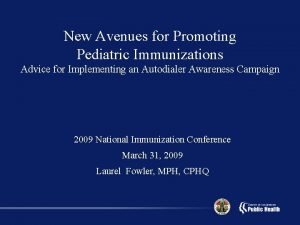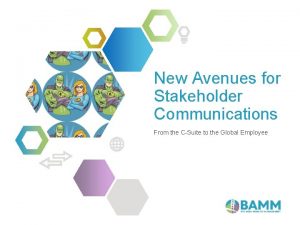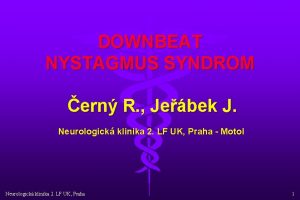NEW AVENUES IN MANAGEMENT OF NYSTAGMUS From Dr









































- Slides: 41

NEW AVENUES IN MANAGEMENT OF NYSTAGMUS From Dr. Shashank Ranade DNB, DOMS, FCPS, FICO(UK) Fellow, Pediatric Ophthalmology, Strabismus & Ocular motility disorders [International Guest Speaker, UK] RANADE SUPER-SPECIALITY EYE CENTRE Mumbai Expert panelist talk given at ALL INDIA OPHTHALMOLOGICAL SOCIETY MEET held at KOCHI, February 2012

Financial Disclosure • I hereby declare that I don’t have any financial interests in any of the products or procedures mentioned in the forthcoming presentation

Nystagmus Work-up • History taking- Onset, consanguinity and family history • Vision assessment- Dilated refraction • Slit lamp examination - iris transillumination defects ? • Fundus examination - Optic nerve or retinal pathologies ? • Eye Movement recordings / EOG / ENG • ERG & p. VEP- CSNB, Cone dyst, Ocular albinism, ON disorders • MRI/ CT Scan and Neurologist opinion -suspected central/subcortical causes • Genetic analysis -FRMD 7 in CIN

EYE MOVEMENT RECORDINGS • • Electo-oculography (EOG) Infrared reflectance (IR) Scleral search coil Video-electronystagmography ( VENG)- Latest & most preferred choice amongst all. Good saccadic resolution and linearity for testing saccades and pursuit, less noisy

Various treatment modalities available • PRISMS • OPTICAL METHODS • SOMATOSENSORY / AUDITORY FEEDBACK • ELECTRONIC METHODS • PHARMACOTHERAPY • SURGERY • GENE THERAPY Fields in which newer avenues have developed

Clinical division of treatment options Older Less practiced Widely practiced Rx Widely practiced Somatosensory Auditory stimuli Optical methods , Prisms Old drugs, Botox Inj , Stereotactic Neuro. Sx and Artf. diverg. Surg Wide recessions , AHP Surgeries Drugs- Gabapentin , Baclofen Drugs- Memantine, 4 -Aminopyridines Newer Surgery- Tenotomy , Aug. Tend. Suture Futuristic Electronic methods Molecular genetics / Gene therapy

OLDER- LESSER PRACTICED TREATMENT OPTIONS

PRISMS Used in 3 scenario’s • Pre-surgical evaluation purpose • Congenital Nystagmus which gets suppressed while viewing near targets- we use 7 D BO prisms • Nystagmus with altered head postures- Amount of prism required ( > 30 pd ), hence it obscures functional vision , are cumbersome and cause chromatic aberration. Dell’Osso LF. Developments of new treatments for congenital nystagmus, Ann N Y Acad Sci

OPTICAL METHODS • More useful in Acquired Nystagmus of Neurological type. • It Stabilises the image on the retina through high convex specs coupled with high negative power CL ( RGP, PMMA). • • Limitations. Disables all eye movements, works monocularly and in stationary state only Field of view -limited Difficult to handle Refinement of an optical device that stabilizes vision in patients with nystagmus, Yaniglos SS, Leigh RJ, Optom Vis Sci, 1992, June, 69 ; 44750

AUDITORY/SOMATOSENSORY STIMULI & BIOFEEDBACK METHOD • Suppression via trigeminal afferents by using a contact lens over cornea or auditory stimuli over forehead or acupuncture over neck muscles and has been primarily found with some effects in CIN. • Biofeedback has not been reported to be useful. Dell Osso, Tracis, Abel, Erzurum-Contact Lens in congenital nystagmus, Clin Vis Sci 1988 ; 3: 229 -32 Sheth, Dell Osso, Leigh, Van Doren-The effects of afferent stimulation on congenital nystagmus foveation periods. Vision Res 1995 ; 35 : 2371 -82

ARTIFICIAL DIVERGENCE SURGERY • Aim - induce exophoria by bi- medial rectus recessions or recess -resect procedure which in turn the patient overcomes by exerting fusional convergence • The former is useful in Congenital nystagmus which dampens on convergence while the later in AHP cases Sedler S, Shallo-Hoffman J, Muhlendyck H. Die Artifizielle-Divergenz-Operation beim kongenitalen Nystagmus. Fortschritte Ophthalmol 1990; 87: 85 -9. Zubcov AA, Stark N, Weber A, Wizov SS, Reinecke RD. Improvement of visual acuity after surgery for nystagmus. Ophthalmology 1993; 100: 1488 -97 Kestenbaum and artificial divergence surgery for abnormal head turn secondary to nystagmus. Specific and nonspecific effects of artificial divergence, Graf. M, Strabismus, 2002 ; June; 10(2): 69 -74.

BOTOX • 25 U of Botulinum Toxin A Injection is injected directly into the retrobulbar space. • Used in : Acquired Nystagmus ( Post CVA )- reduces oscillopsia and improve visual acuity • Effect is short lived (3 to 6 months approx), diplopia and ptosis • Might need to cover the other eye to prevent ‘competition/ diplopia’ Helveston EM, Pogrebiank AE: Treatment of acquired nystagmus with botulinum A toxin. Am J Ophthalmol, 106: 584, 1988. Lennerstrand G, Nordbo OA, Tian S, et al: Treatment of strabismus and nystagmus with botulinum toxin A. Acta Ophthalmol Scand 76: 27, 1998 Ruben ST, Lee JP, O’Neill D, et al: The use of botulinum toxin for treatment of acquired nystagmus and oscillopsia. Ophthalmology 101: 783, 1994.

OLDER – WIDELY PRACTICED TREATMENT OPTIONS

HORIZONTAL RECTUS MUSCLE RECESSIONS • Maximal recession of all 4 horizontal muscles i. e, as high BMRc of 10 mm & BLRc of 12 mm • First suggested by Briti-Bagolini (1960) but revived by Von. Noorden- Helveston (1991) • Not only decreases nystagmus intensity and improve visual acuity but also addresses strabismus and head posture issue effectively after thorough surgical planning. The effect of horizontal rectus muscle surgery on clinical and eye movement recording indices in infantile nystagmus syndrome, Bagheri et al, Strabismus, 2010, June, 18(2) ; 58 -64 Vertical rectus muscle surgery for nystagmus patients with vertical abnormal head posture, Yang MB, Archer et al, J AAPOS, 2004, Aug ; 8 (4), 299 -309

SOURCE- The effect of bilateral horizontal rectus recession on visual acuity, ocular deviation or head posture in patients with nystagmus, Bagheri. A, Farahi A, Yazdani, J AAPOS, 2005, Oct, 9(5), 433 -7

RECESS- RESECT PROCEDURES • 1953, Anderson and Kestenbaum independantly suggested them. Anderson had mentioned about recession of horizontal rectii , While Gotto had suggested resection, Kestenbaum came with idea of operating all the 4 muscles (5 mm) • Parks modified it (5, 6, 7, 8) & Calhoun-Harley -Nelson ‘Augmented’ it. • The surgery not only shifts the eye to null position to correct AHP but also improves nystagmus waveforms and broaden the null zone Anderson JR. Causes and treatment of congenital eccentric nystagmus. Br J Ophthalmol 1953; 37: 267 -80. Kestenbaum A. Nouvelle opération du nystagmus. Bull Soc Ophthamol Fr 1954 Parks MM. Congenital nystagmus surgery. Am Orthopt J 1973; 23: 35 -9

FIG 1. Comparison of preoperative (A) and 3 months postoperative (B) electronystagmogram showing shift of null position from 30° right gaze preoperatively to primary position after augmented Anderson procedure FIG 1 -Prospective Clinical Evaluation of Augmented Anderson Procedure for Idiopathic Infantile Nystagmus , Pradeep Sharma, Vimala Menon, JAAPOS, Aug 2006, 10 (4), 312 -317 FIG 2 - Improvement in Visual Acuity Following Surgery for Correction of Head Posture in Infantile Nystagmus Syndrome Vijayalaxmi, A Kumar, J POS, Nov 2011, 48 (6), 341 -346

HEAD POSTURE CORRECTION SURGERIES Surgery Indication What is done ? Kestenbaum Head turn Bilateral 5 mm recess-resect of hor. recti Augmented Anderson’s Head Turn Yolk muscle recess ( MR-9, LR-12 ) Classic Parks Head turn upto 30 deg 5, 6, 7, 8 Rule Aug Kestenbaum Head turn above 30 deg / Classic Plus (Calhoun-Harley) Necessary augmentaions of 40 % and 60 % required ( for 40 and 45 deg resp) Vert Kestenbaum Chin elevation/depression Bilateral recess-resect of SR & IR /Parks Torsional Kesten Nyst with Head tilt SO & IO surgeries Decker’s Same as above Vertical transposition of horizontal recti Spielmann’s Same as above Surgical slanting of insertion of all 4 recti

PHARMACOTHERAPY

Pharmacology in Nystagmus Name of the drug Mode of action Preferred drug of choice Gabapentin & Baclofen GABA receptor agonists Acquired pendular nystagmus Memantine NMDA receptor antagonist Congenital Idiopathic Nystagmus 4 -Aminopyridines K+ channel blocker Vertical upbeat- downbeat nystagmus Clonazepam Benzodiazapine / GABA a receptor agonist Carbamazepine Na+ channel blocker Sodium valproate Na+ channel blocker & GABA Pendular nystagmus agonists Acetozolamide & Brinzolamiode Carbonic anhydrase inhibitor Infantile Nystamus Benztropine & Trihexphenydyl Anti-Cholinergic Oculopalatal tremor Propranolol B- Blocker Opsoclonus Sup Oblique Myokimia

NEWER- WIDELY PRACTICED TREATMENT OPTIONS

BACLOFEN • Useful in- Acquired Pendular Nystagmus ( esp. post fossa tumors and Post MS) • Recommended dosage schedule- 5 -10 mg TDS • Visible changes noted- reduced amplitude of horizontal pendular nystagmus ( 70 % times ), subjective improvement of oscillopsia ( 45 % times ) and visual acuity improvement ( 35 % times ) • Side effects- Drowsiness(63%), dizziness (15%), Nausea (12%) Effects of baclofen on upbeat and downbeat nystagmus, M Dietrich, A Straube et al, J of Neurology, neurosurgery and Psychiatry, 1991 ; 54 : 627 -32

CASE REPORT 26 yr old, male with h/o horizontal diplopia and dizziness since 2 weeks • Confirmed to have right INO with upbeat nystagmus • MRI - Hyperintense area in right midbrain tegmentum and anterior cerbellar vermis s/o of inflammatory plaque • EEG and evoked potentials were normal • Introduced on 5 mg TDS dose of baclofen • Decrease in nystagmus intensity in primary , right , left , up and down gaze was noticed. •

GABAPENTIN • Useful in- Acquired Pendular–Jerk Nystagmus (esp. Post MS, Post ocular pathology) and CIN • Recommended dosage schedule- 300 – 800 mg TDS • Visible changes noted- reduced amplitude of horizontal pendular nystagmus ( 95 % times ), subjective improvement of oscillopsia ( 60 % times ) and visual acuity improvement ( 35 % times ) • Side effects- Fatigue, dizziness, emotional and behavioral problems in children The effects of gabapentin and memantine in acquired and congenital nystagmus : a retrospective study, T Shery, I Gottlob, Br J O, 2006 ; 90: 839 -843 Gabapentin but not vigabatrin is effective in acquired nystagmus in multiple sclerosis, F Bandini, E Castello et al, Journal of Neurology Neurosurgery Psychiatry, 2001; 71 : 107 -11

CASE REPORT • 60 yr old, male , K/C/O Multiple sclerosis • Presented with elliptical pendular nystagmus • BCVA -OD 6/24, OS 6/60. • Patient put on oral gabapentin. Started on 300 mg TDS and since the patient was able to tolerate with inadequate response the dosage was further increased to 800 mg TDS. • BCVA improved in OD to 6/12 OS to 6/18. • Nystagmus amplitude also showed 50 % improvement. • Now almost 6 years he is still on gabapentin with good tolerance and consistent response. Source- The effects of gabapentin and memantine in acquired and congenital nystagmus : a retrospective study, T Shery, I Gottlob, Br J O, 2006 ; 90: 839 -843 Before Gabapentin RIGHT EYE LEFT EYE After Gabapentin

NEWER- FUTURE TRENDS

MEMANTINE • Useful in- Congenital idiopathic nystagmus, Acquired pendular Nystagmus ( even those refractory to gabapentin ) • Recommended dosage schedule- 10 -20 mg BD • Visible changes noted- reduced amplitude of horizontal pendular nystagmus ( 70 % times ), subjective improvement of oscillopsia ( 45 % times ) and visual acuity improvement ( 35 % times ) • Side effects- Dizziness(7%), headache (6%), confusion (6%), constipation(5%) The effects of gabapentin and memantine in acquired and congenital nystagmus : a retrospective study, T Shery, I Gottlob, Br J O, 2006 ; 90: 839 -843

Memantine dosage schedule (Source- Dept of Ophthalmology, Leicester Royal Infirmary , England) New cases 10 mg BD for 56 days If responds adequately If response is poor / inadequate Shift to maintenance dosage Increase the dosage to 20 mg BD for 56 days 10 mg OD If responds, shift to maintenance dose Maintain on 10 mg BD dose

CASE REPORT 65 yr old, male with c/o oscillopsia, ataxia, hyper-reflexia of right extremities • MRI showed plaques • CSF confirmed the same • Diagnosed with MS • Started on gabapentin 300 and then 800 TDS with poor response • Patient was shifted to memantine 10 mg TDS and showed a spontaneous improvement in nystagmus intensity. • Source- The effects of gabapentin and memantine in acquired and congenital nystagmus : a retrospective study, T Shery, I Gottlob, Br J O, 2006 ; 90: 839 -843 BEFORE TREATMENT AFTER TREATMENT Gabapentin RIGHT EYE LEFT EYE Memantine

4 - AMINOPYRIDINES • A latest study by Strupp et al established the role of 4 Aminopyridines and 3, 4 -diaminopyridines in Upbeat nystagmus secondary to any lesion between pathway from vestibular to oculomotor nuclei • Reduction in oscillopsia and improvement in upward smooth pursuit movement during attempted fixation in daylight ( abolished in darkness !) • Dosage used was- 10 mg OD with no documented side efffects • Probable mode of action is via increased excitability of cerebellar purkinje cells from K+ channel blockade 4 -aminopyridine restores visual ocular motor function in upbeat nystagmus , S Glasauer, M Strupp et al, Jour. Neurol Neurosurg Psychiatry 2005; 76: 451– 453.

Electronic methods • Device uses infrared sensor guided measurement of eye movements and feeding the same to a phase locked loop / adaptive filters which generates an electric signal which in turn rotate the riley prisms synchronous with the nystagmus and through which the person views the world. • In future we might have specs which uses this miniature principle to cancel out the visual effects of pathological nystagmus. Application of adaptive filters to visual testing and treatment in acquired pendular nystagmus, Ryan M. Smith, John S. Stahl, Journal of Rehabilitation, Research & Development, Vol 41, June 2004, 313 -324 Prospects for Treating Acquired Pendular Nystagmus with Servo-Controlled Optics, John Stahl et al, Invest Ophthal Vis Sci, 2000, Apr, 41(5), 1084 -90

Prototype electronic device Infrared device Prism assembly Acuity card

T & R (Tenotomy & Resuturing) • Principle- Operating on the tendon where the Proprioceptive feedback loop for ocular-motor control is located. • Method- Surgically detach the muscles from the globe and suture them back to their original insertions without resection or recession • Holds lots of promise for CIN where AHP is not an issue • There are group of people who don’t believe in and find it contentious • Improves NAFX ( e. Xpanded Nystagmus Acuity Function) - an indicator of target foveation, fastens target acquisition time and also reduce oscillopsia. . Dell'Osso LF, Hertle RW, Williams RW, Jacobs JB. A new surgery for congenital nystagmus: effects of tenotomy on an achiasmatic canine and the role of extraocular proprioception. J AAPOS 1999; 3: 166 -82 Hertle RW, Dell’Osso LF, Fitz. Gibbon EJ, Yang D, Mellow SD. Horizontal rectus muscle tenotomy in patients with infantile nystagmus syndrome: a pilot study. J AAPOS. 2004; 8: 539 -548

Source- Effects of tenotomy on patients with infantile nystagmus syndrome, Wang, Dell Osso et al, JAAPOS, 2006, 10: 552 -560

Simple Augmented Tendon Suture ( ATS) No tenotomy is required. • 3 cross sword sutures with 6 -0 vicryl are placed in the tendon towards the myotendinous junction, not suturing the globe • Probable mode of action- ischemia, irritation and scarring which would act through the proprioceptive loop. It causes relaxation of the resting muscle /steady state innervation and puts it on lower portion of length- tension curve. • Two hypothetical Nystagmus procedures : Augmented Tenotomy and Reattachment and Augmented tendon suture ( Sans Tenotomy ), Dell’ Osso, J Pediatr Ophthalmol Strabismus, 2009; 46: 337 -344

Split Tendon, ATS method As the name suggests you need to do a tendon split along the length and then pass the sutures on either side taking care of the vascular arcades. No concrete evidence has yet been established about this procedure Its efficacy needs to be established and is just a hypothesis in current scenario Two hypothetical Nystagmus procedures : Augmented Tenotomy and Reattachment and Augmented tendon suture ( Sans Tenotomy ), Dell’ Osso, J Pediatr Ophthalmol Strabismus, 2009; 46: 337 -344

GENETICS IN NYSTAGMUS

GENE THERAPY • Applicable in SENSORY DEFICIT NYSTAGMUS secondary to retinal pathologies • Applied to the retina to correct genetic deficits that impair vision directly and may facilitate the development of nystagmus • E. g- RPE 65 gene deficiency in Leber’s Congenital Amaurosis Achromatopsia • Moorefields hosp performed recombinant adenovirus vector guided delivery of missing gene in 3 patients Maguire, A. M. , Simonelli, F et al. (2008). Safety and efficacy of gene transfer for Leber's congenital amaurosis The New England journal of medicine, 358(21), 2240– 2248. Bainbridge, J. W. B. , Smith et al. (2008). Effect of gene therapy on visual function in Leber's congenital amaurosis The New England journal of medicine, 358(21), 2231– 2239

• GENETIC ANALYSIS & COUNSELLING Individual cases- History taking and thorough documentation of family tree will help us know the mode of transmission, associated conditions and penetrance. • Helpful in CIN- FRMD 7 gene mutation, if documented then its known to have better vision, lesser AHP issue and better prognosis • Genetic analysis provides scope for research, which might turn a milestone for gene therapy in future Phenotypical characteristics of idiopathic infantile nystagmus with and without mutations in FRMD 7, Gottlob I, Shery et al, Brain (2008), 131, 1259 -1267

SOCIAL ISSUES • • • Need extra help at school Positioning : Front benches of classroom to match AHP which will improve visual acuity, teachers need to adopt bold writing, high contrast boards Extra-curricular activities- Avoid sports requiring fine vision i. e. , ball games. Instead swimming can be preferred Carrier guidance - Prefer visually less demanding professions Personality development workshops Helpline / Networking In India we don’t have any helpline like NN (Nystagmus Network) in Europe http: //www. nystagmusnet. org/ In US they have the ANN ( American Nystagmus Network) http: //nystagmus. org/ The main intent of these sites/ networks is to improve the quality of life for all persons and families affected by nystagmus, through organized community support, education and public awareness

Thank You
 Communication is the exchange of
Communication is the exchange of Avenues
Avenues Types of investment avenues
Types of investment avenues Peripheral vertigo
Peripheral vertigo Hennebert sign
Hennebert sign Treatment of nystagmus
Treatment of nystagmus Pseudovertigo
Pseudovertigo Nystagmus eyes
Nystagmus eyes Nystagmus market trends
Nystagmus market trends Nystagmus direction
Nystagmus direction Jerk nystagmus
Jerk nystagmus Horizontal nystagmus causes
Horizontal nystagmus causes Mydiatrics
Mydiatrics Pituitary hypoplexy
Pituitary hypoplexy Vertigo central vs peripheral
Vertigo central vs peripheral Meniere's disease
Meniere's disease Hallpikes maneuver
Hallpikes maneuver Nystagmus direction
Nystagmus direction Alexander's law nystagmus
Alexander's law nystagmus Nystagmus
Nystagmus Vestibular evaluation
Vestibular evaluation Miners nystagmus
Miners nystagmus Nystagmus horizontalis
Nystagmus horizontalis Stand und gangproben
Stand und gangproben Nystagmus direction
Nystagmus direction Distinct nystagmus at maximum deviation
Distinct nystagmus at maximum deviation Pyramid levels of management
Pyramid levels of management Top management middle management first line management
Top management middle management first line management Top level management
Top level management Examples of inverted commas
Examples of inverted commas New york, new jersey, pennsylvania, and delaware
New york, new jersey, pennsylvania, and delaware Fresh oil, new wine scripture
Fresh oil, new wine scripture Movies in new hartford ny
Movies in new hartford ny Articles of confederation characteristics
Articles of confederation characteristics New-old approach to creating new ventures
New-old approach to creating new ventures New marketing realities
New marketing realities New years old is new again
New years old is new again New classical and new keynesian macroeconomics
New classical and new keynesian macroeconomics Chapter 16 toward a new heaven and a new earth
Chapter 16 toward a new heaven and a new earth Neil thisse is a loyalist who fled the colonies
Neil thisse is a loyalist who fled the colonies New classical and new keynesian macroeconomics
New classical and new keynesian macroeconomics New nationalism vs new freedom venn diagram
New nationalism vs new freedom venn diagram
